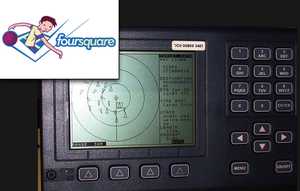How To Run AIS And VHF On One Antenna
With more and more users deciding to install an AIS receiver or transponder, the biggest issue surrounding the equipment is the installation of the extra antennas that are required. An...

They’re both about localisation, but that doesn’t make them apples and apples
By Ryan Skinner (email)
You probably already know AIS. The short-range coastal tracking system identifies vessels near coastlines all over the world’s oceans, with information about the vessel’s name, speed, destination, heading, etc.
You probably don’t know Foursquare. It’s one of those facebook-like social networks, except this one makes a big deal of location. It’s all about where you’re at, where you’re going, where your friends/girlfriend/mother are, etc. These social location services are one of the four big tech trends of 2010, along with mobile web, iPad and toilet-training cats.
There are many ways that AIS and Foursquare are alike:
But they’ve got at least a few salient differences that prevent too close a comparison:
At its root, Foursquare only works if those people whose position it reports, like it. AIS, on the other hand, is just there. You ignore it at your peril. Nonetheless, anyone developing AIS-related services would be wise to look carefully at developments on Foursquare. You always want to be working towards the market’s wants and needs.
So here’s a list of articles about business uses for Foursquare. AIS business developers, dig in:
The NY Times bits blog describes how businesses are using Foursquare statistics.
PBS interviews Foursquare’s chief business development officer, on use of the platform.
Location Meme ran an article about how a restaurant guide (shippers, imagine an agent) uses Foursquare.
Inc.com gives a guide to success on the Foursquare platform.
And lest I forget my friends in marine media, here’s an article about how the big media brands are using Foursquare, to inspire your creative use of AIS.
Some may want to laugh this off, but the Foursquare/AIS analogies are not so far-fetched. For better or worse, fewer and fewer of us are lost under the great blue sky and it’s time to find the costs and benefits of this findability, and manage them.
—
Ryan Skinner is a Senior Advisor at Say PR & Communications in Oslo, Norway and blogs at 59° 56′ N. Innovation, technology, media and ideas in the marine realm are his beat.

Sign up for gCaptain’s newsletter and never miss an update

Subscribe to gCaptain Daily and stay informed with the latest global maritime and offshore news
Essential news coupled with the finest maritime content sourced from across the globe.
Sign Up